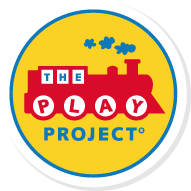Parents
The P.L.A.Y. Project® autism intervention program empowers parents/caregivers to be their child’s best PLAY partner!
Our expert coaches—certified PLAY Project Consultants—empower you to engage with your child in a way that is fun, and promotes the next stages of social-emotional learning.
PLAY Project families experience the joy of seeing their child make progress first hand.
Parent Testimonial
“Through The PLAY Project, we learned how to engage Ben in a fun way and by having fun.
He used to ignore us and now he won’t leave us alone! He didn’t talk now he’s using lots of words. Ben made incredible progress!
The PLAY Consultant videotaped our play and gave us really helpful feedback so we knew what techniques to use and what activities to do with Ben.
The PLAY Project changed our life!”
—Lisa and Steve G.
Top 10 Benefits of The PLAY Project
PLAY offers the earliest possible intervention
PLAY offers the earliest possible intervention and can be used with children as young as a year old who have early signs for ASD.

PLAY empowers parents
PLAY empowers parents/caregivers and gives them the knowledge and skills to be their child’s best play partner.
PLAY is easy to implement
PLAY is easy to implement in the home setting. We teach parents to make every interaction a good interaction.
PLAY is intensive
PLAY is intensive, providing dozens of hours of engaging intervention throughout the week.
PLAY improves interaction and social skills
PLAY improves interaction and social skills, which are the core deficits of autism according to the DSM V, the official psychiatric diagnostic manual.
PLAY helps children with ASD want to be with people
Fun with people’ is our first principle. Watch out! Your child might not leave you alone!
PLAY helps build happier, more connected relationships
PLAY helps build happier, more connected relationships between the child, siblings, and the whole family.
PLAY is evidence based
The peer reviewed published research shows that children whose parents put in the time of engagement and interaction improve in their autism symptoms and make substantial gains in the social interaction and functional development
PLAY is an essential ingredient of a complete program
PLAY is an essential ingredient of a complete program and complements other therapist delivered services including speech/language, occupational therapy, pre-school, and ABA.
PLAY can change public policy
PLAY can change public policy. Ohio has adopted PLAY statewide and helped thousands of children. Click here to view the report.
Frequently Asked Questions
The PLAY (Play and Language for Autistic Youngsters) Project is an evidence-based autism
intervention developed by Rick Solomon MD, a Developmental and Behavioral Pediatrician. The
PLAY Project is devoted to helping parents develop a better connection with their child through
play, and helping the child improve their language, development, behavior, and social skills.
Children do not need an autism diagnosis to benefit from The PLAY Project, any child with
delays in communicating and relating can benefit. We watch parents develop a joyous
relationship with their child because of the PLAY Project.
The PLAY Project Early Intervention Program offers support and training for families of young
children with autism/traits of autism in the home, clinic, school or TelePLAY setting. We find the home
is where the child is most comfortable and acts most naturally. Parents are coached by
credentialed professionals to implement methods and techniques that are effective, fun, and
useful in day-to-day interactions with their child.
Here, our best courses, webinars, bundles, and free articles are curated by Dr. Rick, founder of The PLAY Project, so parents and professionals have the most practical information to help children with autism spectrum disorders reach their full potential. Make sure to check back frequently for new offers and content!
To see more resources Click Here.
The PLAY Project (PLAY) is a developmental relationship based (DRB) approach derived from the developmental theories and models including especially the work of Stanley Greenspan MD and Serena Weider PhD. In DRB there is an emphasis on relationships, fun, and child directed engagement that leads to improvement in the child’s emotional and social development. ABA is a behaviorist approach based on operant conditioning models derived from the work of B.F. Skinner PhD and Ivar Lovaas PhD.
For more information on ABA models of early intervention for children with ASD see the Autism Speaks website Click Here
Check out our PLAY Project finder. Click Here
PLAY is an intensive intervention program because it meets the criteria below and asks parents to engage their child for 1-2 hours per day through a combination of 15-20 minutes PLAY sessions a few times per day and throughout all daily activities.
In 2001, the National Research Council—which gathered together a group of experts on autism—reviewed the scientific literature and recommended that young children with autism receive intensive intervention characterized by the following 5 points:
1. Start early. Children with autism can often be diagnosed as early as 14 months!
2. Provide 10-15 hours per week, depending on the severity of the ASD.
3. Intervention should have a 1:1 or 1:2 adult to child ratio for services i.e. one adult works individually with one or two children, usually one on one to start.
4. The intervention must be socially engaging.
5. Intervention should also be strategic, comprehensive, and evidence-based. Intervention must use strategies that are structured, address the comprehensive needs of children with ASD (namely, social, educational, language, behavioral, and physical/sensory needs) and should be based on solid research evidence.
Research for The PLAY Project was done with children with an autism diagnosis and their families. However, The PLAY Project model has been successfully used in many settings with children that show red flags for autism or have delays in communicating and relating.
Parent Implemented Models (PIM) train parents to help their child.
Other models like behaviorist interventions (see below), schools, speech/language and occupational therapy use therapists to deliver intervention.
The great advantage of PIM is that parents spend the most time with their children and can give more intensive intervention. Even a single parent or two working parent family spends 40+ hours waking time per week with their child!
PIM focus on empowering parents to be their child’s best helper. This gives the parents a deep satisfaction and confidence that they know how to help their own child. When parents learn to successfully engage their hard to engage child with autism it is a joyous experience.
The research evidence for Parent Implemented Models (PIM) is growing and is strong with over a dozen recent rigorous studies (see link) that show that parents can learn to be engaging with their young child with ASD and that children who participate in PIM make interactional and social gains. The PLAY Project’s research is one of the, if not the, most rigorous study done using the PIM approach in the U.S.
Click here to see a list of recent scientific articles.
The evidence shows that parents can learn to be engaging with their young child with ASD and that children who participate in PIM make interactional and social gains.
For a description of The PLAY Project’s rigorous scientific research click here.
For parents who want a more in depth understanding of The PLAY Project Intensive Intervention, we recommend:
- The online Welcome to The PLAY Project page
- For more information about Dr. Rick’s book Autism: The Potential Within and The PLAY Project Parent Guide as well as other resources visit The PLAY Project Store.
- Our Contact Information:
Watch as Dr. Rick coaches the parents of Jude to use PLAY Project methods

To read a great article on how The PLAY Project works check out the Detroit Jewish News.
To read about activities that parents can do with their child check out the PLAY Project Parent Guide.
